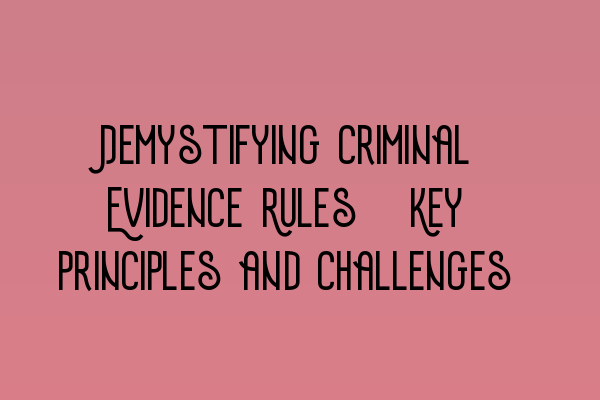Demystifying Criminal Evidence Rules: Key Principles and Challenges
As a criminal solicitor, understanding the rules of evidence is essential for successfully representing your clients in court. The rules governing the admissibility and presentation of evidence play a crucial role in criminal proceedings, shaping the outcome of cases. In this blog post, we will demystify the key principles of criminal evidence rules and discuss the challenges faced by legal professionals in this area.
The Importance of Criminal Evidence Rules
Criminal evidence rules are designed to ensure fair and reliable adjudication of cases in the criminal justice system. These rules dictate what evidence can be presented in court, how it should be presented, and the standards of proof required for conviction. Adhering to these rules is crucial to uphold the principles of justice and safeguard the rights of both the prosecution and the defense.
When gathering evidence for a criminal case, it is essential to ensure its admissibility in court. The rules of evidence determine whether evidence can be presented or challenged by either party. This includes considerations such as relevance, hearsay, character evidence, and privilege.
Relevance is a fundamental principle in criminal evidence rules. Evidence must be relevant to the case at hand and have a probative value in establishing or rebutting a fact in issue. Irrelevant evidence may be excluded to prevent confusion or prejudice.
SQE 1 Practice Exam Questions are an excellent resource for aspiring criminal law professionals to test their knowledge of evidence rules and understand how they may apply in practice.
Challenges in Applying Criminal Evidence Rules
While criminal evidence rules provide a framework for determining the admissibility of evidence, its application can be challenging. Legal professionals often encounter complex situations where the rules intersect, and their interpretation and application may vary.
One common challenge is handling hearsay evidence. Hearsay refers to statements made by an out-of-court declarant that are offered for the truth of the matter asserted. Hearsay evidence is generally inadmissible unless it falls within an exception. Determining whether a statement falls within an exception can be complex and require a careful analysis of the circumstances.
Another challenge arises when dealing with character evidence. Character evidence refers to evidence that suggests a person’s propensity to act in a certain way based on their character traits. Generally, character evidence is inadmissible to prove conduct in a specific instance, unless it is directly relevant to a fact in issue, such as self-defense. The challenge lies in distinguishing between character evidence and evidence of a person’s reputation or opinion, which may be admissible under certain circumstances.
To navigate these challenges effectively, criminal law professionals should consider enrolling in SQE 2 Preparation Courses that offer comprehensive guidance on evidence rules and their practical application.
Conclusion
Criminal evidence rules play a crucial role in ensuring a fair and just criminal justice system. Legal professionals must have a thorough understanding of these rules to effectively represent their clients in court. By familiarizing themselves with the key principles and challenges of criminal evidence rules, solicitors can navigate the complexities of evidence admissibility and presentation, thereby contributing to the administration of justice.
For aspiring solicitors, it is essential to invest in high-quality SQE 1 Preparation Courses to develop a strong foundation in criminal law and evidence rules. Additionally, staying updated with the latest SRA SQE Exam Dates is crucial for proper exam planning and preparation.
Remember, understanding criminal evidence rules is not only a professional requirement but also a means to protect the rights and fair treatment of individuals within the criminal justice system.
